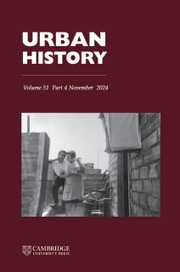Crossref Citations
This article has been cited by the following publications. This list is generated based on data provided by
Crossref.
Somer, Eli
Ruvio, Ayalla
Sever, Ilana
and
Soref, Erez
2007.
Reactions to Repeated Unpredictable Terror Attacks: Relationships Among Exposure, Posttraumatic Distress, Mood, and Intensity of Coping1.
Journal of Applied Social Psychology,
Vol. 37,
Issue. 4,
p.
862.
Beaven, Brad
and
Griffiths, John
2008.
Creating the Exemplary Citizen: The Changing Notion of Citizenship in Britain 1870–1939.
Contemporary British History,
Vol. 22,
Issue. 2,
p.
203.
Moshenska, Gabriel
2010.
Gas masks: material culture, memory, and the senses.
Journal of the Royal Anthropological Institute,
Vol. 16,
Issue. 3,
p.
609.
Robinson, James Philip
2012.
Invisible Targets, Strengthened Morale: Static Camouflage as a ‘Weapon of the Weak’.
Space and Polity,
Vol. 16,
Issue. 3,
p.
351.
JAMES, ROBERT
2013.
Cinema-going in a port town, 1914–1951: film booking patterns at the Queens Cinema, Portsmouth.
Urban History,
Vol. 40,
Issue. 2,
p.
315.
Smith, Barbara
Parsons, Matthew
and
Hand, Jennifer
2014.
War Leaves an Enduring Legacy in Combatants’ Lives.
Journal of Gerontological Social Work,
Vol. 57,
Issue. 8,
p.
790.
Moore, Aaron William
2018.
Bombing the City.
Langhamer, Claire
2019.
Mass observing the atom bomb: the emotional politics of August 1945.
Contemporary British History,
Vol. 33,
Issue. 2,
p.
208.
MORLEY, JOEL
2020.
THE MEMORY OF THE GREAT WAR AND MORALE DURING BRITAIN'S PHONEY WAR.
The Historical Journal,
Vol. 63,
Issue. 2,
p.
437.
Ishikawa, Hanako
2020.
Winston Churchill in the British Media.
p.
157.
Pooley, Colin G.
and
Pooley, Marilyn E.
2022.
Everyday Mobilities in Nineteenth- and Twentieth-Century British Diaries.
p.
195.
Cornell, Samuel
Nickel, Brooke
Cvejic, Erin
Bonner, Carissa
McCaffery, Kirsten J.
Ayre, Julie
Copp, Tessa
Batcup, Carys
Isautier, Jennifer
Dakin, Thomas
and
Dodd, Rachael
2022.
Positive outcomes associated with the COVID‐19 pandemic in Australia.
Health Promotion Journal of Australia,
Vol. 33,
Issue. 2,
p.
311.


